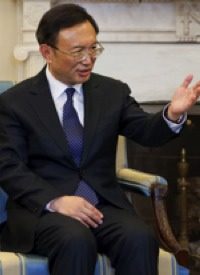
Building on a February 2008 proposal by the governments of China and Russia, the communist regime in the People’s Republic of China is now pushing for a ban on weapons in space.
According to an Associated Press story, Yang Jiechi, the Chinese foreign minister, addressed the topic today at the Conference on Disarmament in Geneva. AP quotes Yang as follows, "Outer space is now facing the looming danger of weaponization. Credible and effective multilateral measures must be taken to forestall the weaponization and arms race in outer space."
Given the fact that China and the United States have already successfully tested weapons capable of destroying satellites, the topic of an arms race in outer space is far from hypothetical. Yang’s comments will almost certainly be welcome news to the Obama administration, which is on record as supporting such a ban. According to a January 25 Reuters story, “Moments after Obama’s inauguration last week, the White House website was updated to include policy statements on a range of issues, including a pledge to restore U.S. leadership on space issues and seek a worldwide ban on weapons that interfere with military and commercial satellites. It also promised to look at threats to U.S. satellites, contingency plans to keep information flowing from them, and what steps are needed to protect spacecraft against attack.”
However, unnamed sources within the administration hint that Obama may pursue a course that amounts to little more than unilateral disarmament in space. According to the Reuters story: “A defense official, who also asked not to be named, said the Obama administration had not yet held briefings for top officials working on military space issues, but it was clear that the focus would shift toward more diplomatic initiatives. Work on classified projects involving an ‘active’ military response to attacks against U.S. satellites might be halted in favor of more monitoring and passive protection measures, he said.”
Another unnamed defense official told Reuters, “The new administration would work through the complex military space issues during a defense review to be completed by September, and as part of a space report due in December.” The defense review would certainly explain the timing of Yang’s remarks, as they lend support to those favoring Obama’s desired ban on weapons in space.
Consulting Yang’s full August 12 remarks reveals several additional interesting points. First, the two paragraphs devoted to the topic of weapons in space come at the end of a six-page address that is primarily devoted to issues of nuclear arms control. Yang insisted, “China opposes the proliferation of weapons of mass destruction (WMD) and their means of delivery…. China calls for peacefully resolving the nuclear issue on the Korean Peninsula and Iranian nuclear issue through dialogue and negotiation, and has made unremitting efforts toward this goal” — but China’s actions tell a very different story. China’s “record” on nuclear proliferation and disarmament provide an enlightening context for evaluating Yang’s call for disarmament in space.
Second, Yang called on the Conference on Disarmament to “soon start substantive discussions on the draft [the draft Treaty on the Prevention of the Placement of Weapons in Outer Space] so as to contribute to improving the legal system concerning outer space and maintaining its security.” Among other provisions of the draft treaty, it may be noted in Article XI that the treaty would be of “unlimited duration” — an utterly unworkable provision in any treaty concerning future developments in outer space. Furthermore, given the United Nations’ checkered record regarding the inspection and monitoring of Earth-based WMDs, it defies belief that any meaningful enforcement of the treaty could be carried out with regard to totalitarian regimes, since under Article VI any “transparency and confidence-building” measures would be strictly voluntary, and any space-based weapons (whether directed toward Earth, satellites, or space stations) would fall outside areas accessible to UN inspectors.
The timing of Yang’s remarks and the defense review should give a signal to watch for further developments in the coming weeks. In the midst of the media attention devoted to economic issues and healthcare reform proposals, there are grounds for being concerned that the United States may concede important strategic “high ground” without a shot having been fired or may become a party to an essentially unenforceable treaty which allows potential enemies to prepare for war far beyond the reach of any inspector.
Photo: Yang Jiechi



